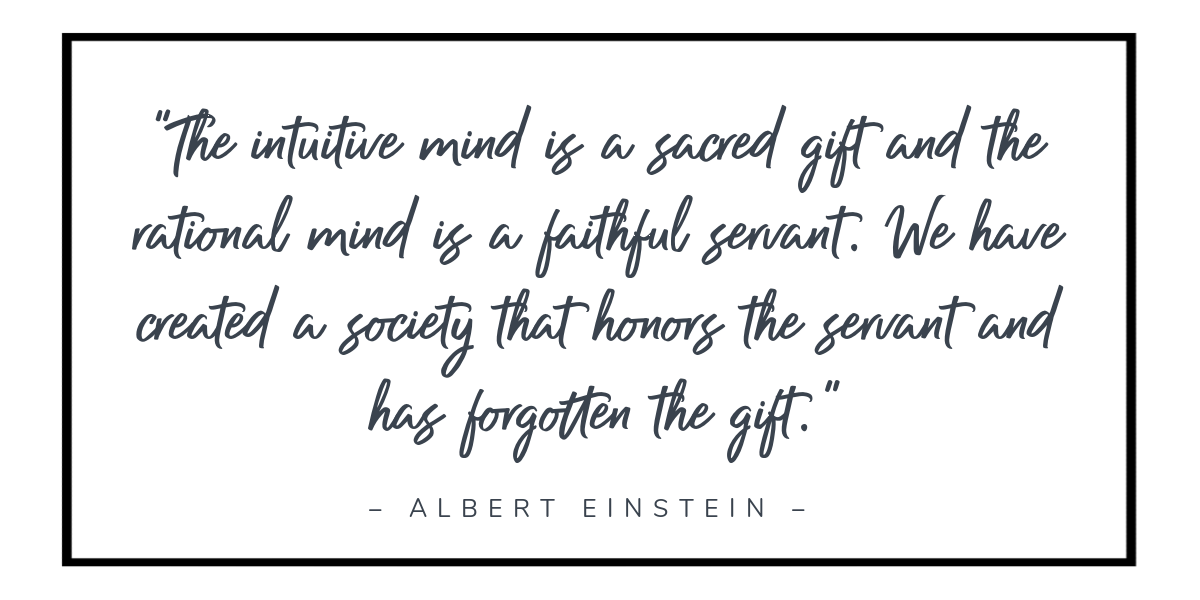 We’ve all had that “feeling” arise–a hunch or a sudden sense guides us on what to do next or gently stops us from proceeding. We hear the whisper that directs us down a new road and leads us to explore a new topic or to avoid a bad situation.
We’ve all had that “feeling” arise–a hunch or a sudden sense guides us on what to do next or gently stops us from proceeding. We hear the whisper that directs us down a new road and leads us to explore a new topic or to avoid a bad situation.
Intuition. We all have intuition, whether we claim it or not. It is part of how we make decisions and it is honored not only by spiritual traditions, but also by scientists that “suddenly” make a new discovery. And the truth is, we make better decisions when we allow intuition a seat at the table.
Making money decisions is no different. When we tune into our inner voice, the voice of wise counsel, we can make better decisions about money: how to spend it, earn it, save or invest it.
Now, let me be clear that using our analytic reasoning to make decisions is obviously important. We gather information, analyze it, weigh pros and cons, and decide. This logical aspect of our brain is a potent key to our success in the world. It is simply not the only key!
Ideally, we use both our intuition and our rational intellect to make money decisions. Together they make a powerful combo. Think of it this way: intuition operates from the right side of the brain and rational intellect operates from the left side. Why would we only use half our brain??
Or said another way, when we use both the head and the heart, we make better money decisions.
Author Aletheia Luna writes in the book, The Spiritual Awakening Process, “Our unconscious minds are oceans of wisdom, understanding, and insight. Intuition, that mysterious inner guide we all have, is a manifestation of this vast untapped world within us. Learning to trust your intuition will help you live a life true to yourself and your deepest needs….”

The question is: how do we access our intuition?
And sometimes we fear that if we “listen to intuition” or our gut, we will be led astray. People sometimes ask me, “How do I know if it’s intuition as opposed to just my fears that are talking?” Or “How do I know this is not just wishful thinking?”
One of the biggest keys to accessing intuition is to be in a calm space when you tune into it. Fear is anything but calm. When we make decisions from a fear-based place, we feel anxiety, stress, and sometimes a feeling that “we’d better do this or else…”
I believe intuition is soul guidance. It comes from a higher place within us.
Recently I was reading the spiritual classic “Autobiography of a yogi”, and while not on money, I was struck by how Yogananda spoke to using intuition to make better decisions. He writes, “Intuition is soul guidance, appearing naturally in people during those instants when their mind is calm. Nearly everyone has had the experience of an inexplicitly correct “hunch”… The goal of yoga science is to calm the mind, that without distortion it may hear the infallible counsel of the inner voice.”
The tips I’m about to share will help you find this calm space to better access your money intuition.
You don’t have to practice meditation to access this voice when you are debating if you should buy that car, raise your fees, make an offer on the house, or attend the Nordstrom’s half yearly sale. The question is, can you allow yourself to tune inside to that inner quiet voice that has guidance for you, in addition to using your wonderful rational brain?
With all this in mind, here are seven tips on how to access your money intuition:
- Give yourself a quiet calm space to reflect on what you are deciding. Intuition can only operate when you are in a calm space. It is literally very quiet, for one thing. You generally can’t hear it in a loud environment. Intuition itself comes from our subconscious- or more accurately- beyond the conscious mind. Its source is in our higher consciousness. So it may take a while to calm oneself and tune inward to this space. If you are debating a money decision, can you take the time to take a walk? Can you listen to some favorite calming music? Can you light a candle and do some journaling with your morning coffee? This is something I do. (You can use the questions in tip number 7.)
- Intuition often speaks in feelings and images–not necessarily words. So ask yourself, “How will I feel if I do this?” Be aware of the first feeling that arises: Happy? Excited? Scared? Worried?
- If you have more time to make a decision, such as buying a house or changing a job, pay close attention to your dreams. Remember that intuition speaks in images. What might the dream be telling you?
- Some people are very “body aware”. If you often get information through your body, or through sensing (called clairsentience) than pay attention to what your body or senses are telling you. What does your “gut” tell you? Do you get a little queasy when you think of buying a brand-new car vs one that is two years old? Or does your stomach soar with a warm feeling?
- Pretend you hear it, until you feel more confident. As strange as it sounds, if it feels weird to you to try to listen to an internal voice, or if you simply don’t hear anything, then simply imagine that you do. Say to yourself, “if I was my intuition and I was speaking from my higher self, what might I whisper to myself about this decision?”
- Remember, intuition is inherently gentle and never threatening. It is from the highest part of ourselves. This means that if you feel “pressured” to do something, or a feeling comes up that says, “I’d better do this or else”, that is the voice of fear talking–not intuition.
- Intuition does not exist in normal time. Since it is from our highest self, it has full access to our past as well as our future. (Apologies if this is too metaphysical for some.) If you prefer, it has access to the collective unconscious that is talked about in Jungian psychology. This means its wisdom extends beyond the here and now. It knows what is in your best interest in the future as well. Therefore, you can ask it very big questions like:
-
- What decision is ultimately in my highest good?
- What does my future self advise me?
- What decision will bring me the greatest peace?
Ultimately, when we bring both our minds and our hearts to money decisions, we make better decisions. Once you are done rationally analyzing something and “running the numbers”, allow yourself some time to simply quietly reflect on the decision you are debating. When you tune inward, what does your inner guidance whisper? Pay attention to this quiet voice. Reflect upon it. Let it provide wise counsel. Listen thoughtfully, then decide and act, without second thoughts.

